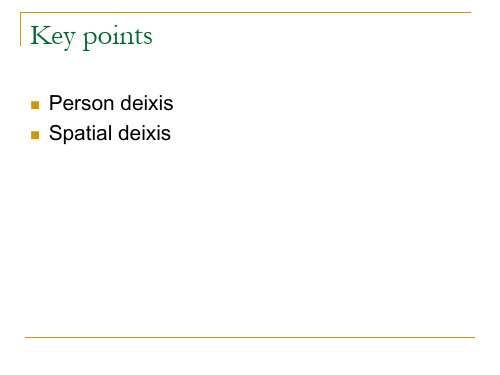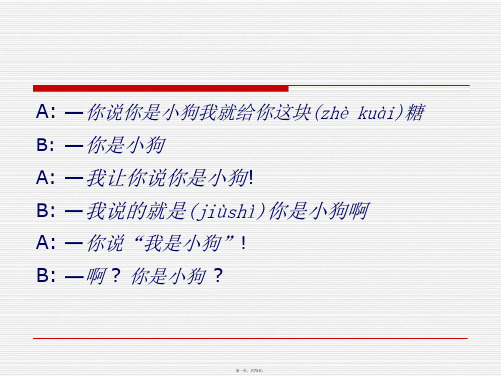语用学 deixisppt课件
合集下载
语用学 指示语

bring also are components of place deixis
Equivalents of these words can be found in Chinese, that is:这儿, 那儿,这个,那个,左和右,来和去,带走和拿来。
③除此之外,地点指示语可以是表示空间位置的副
• last指示的是上一章中讲述意识流的信息,或是传达该信 息的篇章部分 • I bet you haven’t heard this story… this指示接下来要叙述的故事,或是叙述故事的那个篇章部 分。
• Now I wonder through my garden indecisively, trying to hold on to the last days of late summer. • Now主要的是起到语篇的衔接作用 • Here we choose to define...as... • here 指示的是这部分要叙述的内容
地点指示语指话语涉及的地点或空间位置。 ①In English, location adverbs and demonstratives such as :here, there,this,that,left, right are typical place deixis.
②Besides, pairs of motion verbs such as come and go, take and
词,或由“介词+方位名词”组成表示空间位置的
介词短语,或者是“介词+物体”等组成的表示方
位的介词短语。
英语中的come和go可以表示言语时间参与者的 移动方向不同:
• He is coming. He is going.
《语用学Pragmatics》课件 第四周

addressee. Inclusive “we”: speaker and addressee included.
examples
(1)1. Debby: Go anywhere today? 2. Dan: Yes, we went down to Como. Up by bus, and back by hydrofoil.
Key points
Person deixis Spatial deixis
Difficult points
Deictic projection Non-deictic usage of the dictic expressions Psychological distance
2.1 Deixis
编码时间:(Coding time, 简称CT) 接收时间:(receiving time, 简称RT) 时间指和空间指的重要区别:CT和RT是一致
的,但在语言活动中,交际双方却永远不可能 处于同一空间位置。
Deictic center
说 ____go______take________>there
Psychological distance
Speaker may also wish to mark somethng that is physically close (for example, a perfume being sniffed by the speaker) s psychologically distant ‘I don’t like that’.
Speakers also seem to be able to project themselves into other locations prior to actually being in those locations:
examples
(1)1. Debby: Go anywhere today? 2. Dan: Yes, we went down to Como. Up by bus, and back by hydrofoil.
Key points
Person deixis Spatial deixis
Difficult points
Deictic projection Non-deictic usage of the dictic expressions Psychological distance
2.1 Deixis
编码时间:(Coding time, 简称CT) 接收时间:(receiving time, 简称RT) 时间指和空间指的重要区别:CT和RT是一致
的,但在语言活动中,交际双方却永远不可能 处于同一空间位置。
Deictic center
说 ____go______take________>there
Psychological distance
Speaker may also wish to mark somethng that is physically close (for example, a perfume being sniffed by the speaker) s psychologically distant ‘I don’t like that’.
Speakers also seem to be able to project themselves into other locations prior to actually being in those locations:
Deixis指示语 课件

? You can never tell what sex they are nowadays. (everyone)
? There we go. (idiomatic expression) ? I did this and that. (idiomatic expression)
第十二页,共73页。
modest.
第十九页,共73页。
‘We' means ‘you'
How are we feeling today?
When the speaker wants to show his concern and to share the problem with the addressee
咱爸咱妈 咱老爷子身体(shēntǐ)怎么样?
1.4 Different uses of deictic expressions
第三页,共73页。
1.1 Deixis
Deixis – indicating, pointing
Deictics Deictic words
Deictic expressions Yehoshua Bar- Hillel 1954
第二十页,共73页。
‘You':
indefinite pronoun in informal situations
My son is very naughty. Once you buy him
any toy, he will always break it into little
pieces before you know it.
(deictics, indexicals, indexical expressions)
? There we go. (idiomatic expression) ? I did this and that. (idiomatic expression)
第十二页,共73页。
modest.
第十九页,共73页。
‘We' means ‘you'
How are we feeling today?
When the speaker wants to show his concern and to share the problem with the addressee
咱爸咱妈 咱老爷子身体(shēntǐ)怎么样?
1.4 Different uses of deictic expressions
第三页,共73页。
1.1 Deixis
Deixis – indicating, pointing
Deictics Deictic words
Deictic expressions Yehoshua Bar- Hillel 1954
第二十页,共73页。
‘You':
indefinite pronoun in informal situations
My son is very naughty. Once you buy him
any toy, he will always break it into little
pieces before you know it.
(deictics, indexicals, indexical expressions)
商务英语语用学教程课件 Chapter 7

• E.g.: 1. At that time, everybody is very happy. 2. If I were you,...
3. We're going to Qindao this August. v.s We had a good time in Qindao this August.
• Some Asian languages, such as Japanese, Thai, Korean, and Javanese etc. have honorifics.
• E.g.: 1. Dr. Fawcett is conducting a lecture. 2. Would Your Highness care for a drink?
Table 7.1 Commonly Used Person Deixis
Person
Number
Nominative
Accusative
Possessive Pronoun
Reflexive Pronoun
first
Singular
I
me
my
Plural
we
us
our
second
singular
2005:194). Now, tomorrow and next year
are all time deixis.
• Deictic time adverbs refer to some pure
time deixis such as now, then, recently, soon etc.
• Non-deictic time adverbs are based on
语用学课件_Pragmatics_

Number No number category : (Piraha, Kawi) Singular-plural: (Chinese, West Dani ) Singular-dual-paucal-plural: (Yimas, Murik, Meryam Mir)
Person 1 2 3
2.1 Deictic vs non-deictic usages
Deictic usage : what the deictic expression refers to depend on the specific context it occurs. non-deictic usage: non-deictic expression is an expression for which you don’t need context to understand it since it doesn’t refer to anything in particular, on the contrary, it is used in a general sense.
a. He came here one hour ago. b. You can’t lose what you never had.= c. One can’t lose what one /he never had. a, which contains deictic expressions, is context dependent. In isolation, the sentence doesn’t convey much information because we have no idea about who came to what place at what time .He, here, and one hour ago being deictic items. While in b, the second-person pronouns are non-deictic expressions. you can be replaced with one.
《语用学deixis》PPT课件

centaurs, goblins, dragons, phoenix,…
In
pragmatic sense, we might think of reference as an act in which a speaker, or writer, uses linguistic forms to enable a listener or reader, to identify something. Those linguistic forms are referring expressions, which can be: Proper nouns: Shakespeare, Cathy Revuelto, Hawaii,…. Noun phrases: the author, the singer, the island, …or a man, a woman, a beautiful place,… Pronouns: he, it, her, them,…
A
horse is a four-legged solid-hoofed animal with flowing mane and tail, used from early times to carry loads, for riding, etc. My horse is white.
Unicorns,
Referennse and reference
•Referential and attributive uses
•Names and referents
•The role of co-text •Anaphoric reference
The
sense is the "cognitive significance" or "mode of presentation" of the referent. The sense of a proper name is whatever meaning it has, when there is no object to be indicated. The reference is the object that the expression refers to. The reference (or referent) of a proper name is the object it means or indicates.
语用学之指示语ppt课件

33
(28)《人妖生活不容易》 人妖在泰国虽然不能真正为主流社会所接受,但好在并
不遭受很大的歧视,学校里有人妖学生,商场里有人妖售 货员。据不完全统计,到20世纪90年代,泰国人妖的数量 已达2万多。
大多数人妖选择这条道路是为了挣钱,也有一些人则 是天生的性别错位,但走上这条路后,大多数人妖都发现, 她们不但要经历生理和心理的磨难,挣钱糊口也并非想象 中那样简单。泰国法律规定,人妖仍然是男性,不过人妖 在社会日常生活中定位为女性。人妖上公共卫生间会根据 自己当天的服饰选择,如果是女性装束,那么自然去女卫 生间。
“结婚的钱由谁来出?”,《实话实说》1996年11月
24
“我们”、“咱们”与“we”表示第 一人称复指关系,交际中存在三种用法:
A.包括交际的双方或多方,对方可以 在场,也可以不在场或根本不存在
B.不包括交际的对方 C.仅指交际的对方或听话人一方,不 包括说话人一方
25
(22)主持人:你管片的居民都怕不怕你? 观众二:我没把自己当成一个警察就老去管
蒂芬妮歌舞团成立之初只有3名职业人妖演员。她们 出于自身爱好,模仿当时著名的百老汇歌舞演出。由于模 仿逼真而且专业素质高,她们一炮打响并迅速走红。如今, 蒂芬妮歌舞团已有100多名全泰国最美艳的专业人妖演员, 名气堪比法国红磨坊,演出场地也从最初简陋不堪的小舞 台该在奢华的仿古希腊式建筑大剧场内,观众座位达千席。
26
(23)我们是学生,我们的主要任务是学习。
你们/你
语用功能:批评、劝诫,移情,从学生角度出 发,提高该话语的可接受性与劝说力
(24)我们认为,语用学与社会语言学之间存在很
多交叉现象。
我
语用功能:仅指作者本人,不包括读者在内的
(28)《人妖生活不容易》 人妖在泰国虽然不能真正为主流社会所接受,但好在并
不遭受很大的歧视,学校里有人妖学生,商场里有人妖售 货员。据不完全统计,到20世纪90年代,泰国人妖的数量 已达2万多。
大多数人妖选择这条道路是为了挣钱,也有一些人则 是天生的性别错位,但走上这条路后,大多数人妖都发现, 她们不但要经历生理和心理的磨难,挣钱糊口也并非想象 中那样简单。泰国法律规定,人妖仍然是男性,不过人妖 在社会日常生活中定位为女性。人妖上公共卫生间会根据 自己当天的服饰选择,如果是女性装束,那么自然去女卫 生间。
“结婚的钱由谁来出?”,《实话实说》1996年11月
24
“我们”、“咱们”与“we”表示第 一人称复指关系,交际中存在三种用法:
A.包括交际的双方或多方,对方可以 在场,也可以不在场或根本不存在
B.不包括交际的对方 C.仅指交际的对方或听话人一方,不 包括说话人一方
25
(22)主持人:你管片的居民都怕不怕你? 观众二:我没把自己当成一个警察就老去管
蒂芬妮歌舞团成立之初只有3名职业人妖演员。她们 出于自身爱好,模仿当时著名的百老汇歌舞演出。由于模 仿逼真而且专业素质高,她们一炮打响并迅速走红。如今, 蒂芬妮歌舞团已有100多名全泰国最美艳的专业人妖演员, 名气堪比法国红磨坊,演出场地也从最初简陋不堪的小舞 台该在奢华的仿古希腊式建筑大剧场内,观众座位达千席。
26
(23)我们是学生,我们的主要任务是学习。
你们/你
语用功能:批评、劝诫,移情,从学生角度出 发,提高该话语的可接受性与劝说力
(24)我们认为,语用学与社会语言学之间存在很
多交叉现象。
我
语用功能:仅指作者本人,不包括读者在内的
语用学deixis学习教程.pptx

• Social deixis: • 语言结构中能反映出语言使用者的身分和
相对社会地位的那些词语和语法范畴 • tu/vous distinction in French,
Chinese counterparts?? • Ni/nin
第16页/共49页
社交指示(社会指示)
❖ 语言中的社交指示信息,根据菲尔默(Fillmore)的意见,可以在下面几个方面得 到反映: A 人称标记,如语言中的代词等的应用。 B 不同的言语平面(speech levels),如坦率或礼貌的言谈、敬语或谦语等的认别。 C 谈话场合,如正式与非正式场合、严肃与随便场合的区别。 D 人名、职务和亲属的称谓,如根据说话人、听话人和第三者的关系反映出不同的 称谓表达方式。 E 作为社交行为的言语表现方式,如问候、道谢等 F 配合其他社交行为而使用的言语表现方式。 G 说话人运用言语手段向听话人发出的种种指示信息。
(ⅴ) the social center
the speaker ’s social status and rank , to which the status or rank of address第e22e页s/共o4r9页referents is
第23页/共49页
• The deictic projection • The speaker speaks as if the
This can be understood as egocentric
第21页/共49页
deictic center (ⅰ) the central person
the speaker
(ⅱ) the central time the time at which speaker produces the utterance.
相对社会地位的那些词语和语法范畴 • tu/vous distinction in French,
Chinese counterparts?? • Ni/nin
第16页/共49页
社交指示(社会指示)
❖ 语言中的社交指示信息,根据菲尔默(Fillmore)的意见,可以在下面几个方面得 到反映: A 人称标记,如语言中的代词等的应用。 B 不同的言语平面(speech levels),如坦率或礼貌的言谈、敬语或谦语等的认别。 C 谈话场合,如正式与非正式场合、严肃与随便场合的区别。 D 人名、职务和亲属的称谓,如根据说话人、听话人和第三者的关系反映出不同的 称谓表达方式。 E 作为社交行为的言语表现方式,如问候、道谢等 F 配合其他社交行为而使用的言语表现方式。 G 说话人运用言语手段向听话人发出的种种指示信息。
(ⅴ) the social center
the speaker ’s social status and rank , to which the status or rank of address第e22e页s/共o4r9页referents is
第23页/共49页
• The deictic projection • The speaker speaks as if the
This can be understood as egocentric
第21页/共49页
deictic center (ⅰ) the central person
the speaker
(ⅱ) the central time the time at which speaker produces the utterance.
- 1、下载文档前请自行甄别文档内容的完整性,平台不提供额外的编辑、内容补充、找答案等附加服务。
- 2、"仅部分预览"的文档,不可在线预览部分如存在完整性等问题,可反馈申请退款(可完整预览的文档不适用该条件!)。
- 3、如文档侵犯您的权益,请联系客服反馈,我们会尽快为您处理(人工客服工作时间:9:00-18:30)。
(1)你想在事业上取得成功,你就必须
下一番苦功夫。
(2)你要记住,我们(=你)是学生,我们(= 你)的主要任务是学习。
11
(3)同志,咱们(=你们)这儿有海尔电 冰箱吗?
(4)咱们(=你,对小孩)别哭,妈妈给 你拿好吃的。
Q. 汉语中哪些情况下第二人称指示信 息可以用第一人称指示语来表达??
这种现象的语用学解释??
12
第二人称指示还可以泛指任何人,这时 用单数\复数代词表示?
4
classification
Person deixis: me, you, etc.人称指示 patial/place deixis: here, there…地点指示
Temporal/time deixis: now, then…时间指示
Others termed discourse deixis (that, this) Social deixis (tu, vous) 篇章指示 社交指示
6
2. Pragmatic description
2.1 categories used to describe deixis
Person deixis: the role of participants
1st person: the speaker 2nd person: the hearer 3rd person: third party (neither
Deixis
指 示 语
1
1. What is Deixis?
1) Knowledge is power. 2) I am the British Prime Minister. 3) The President met the British Prime
Minister there yesterday.
Q. Can truth-conditional semantics account for these three sentences equally well? If not, where are the differences between them?
2
1.2 Defining Deixis
Let’s give you a hand. (=Let me give you a hand.) 汉语??我们--我?
9
第一人称复数代词借指单数的 功能在汉语中是常见的。
(1)经过观察和分析,我们认 为…… (2)本文只对乔姆斯基的转换 生成语法作一概述,有关它的 近期发展我们准备另文介绍。 (3)咱们(=我)是个计算机 盲,不会拨弄那玩意儿。
A deictic expression is used to indicate something in the immediate context. So a deictic expression encodes information in context (Yule, 1996)
3
Deictics are expressions whose interpretations make essential reference to certain aspects of their contexts of utterance, including the role of participants in the speech event and their spatio-temporal and social location.
the speaker nor the hearer)
7
学生:“A病了,今天不能去上课了, 他让我跟您请个假。”
教授:“好的,我知道了。那么, 你是谁?”
学生:“是我的同屋。”(Levinson,1983) 人称指示是以发话人作基准的,受话 人理解话语时自然要对人称指示作相 应的变换。这已成为一语 (1)Let’s go to the cinema. (2)? Let’s go to see you tomorrow.
根据夸克等人(Quirk et. al)合著的 《当代英语语法》(1973),let’s在非 常通俗的口语中有时也可用作单数,这 就是说它可以不包括谈话的对方,而只 借指单数的“让我”,相当于let me:
A technical term from Greek, meaning “pointing” via language.
Any linguistic form used to accomplish this “pointing” is called a deictic expression, which is also called an indexical.
To put it simply, those expressions whose meaning cannot be fully understood without reference to the context in which they are uttered, or whose references depend critically on the context in which they are uttered (Levinson,
10
2nd person
1. We should not do it, Tom. 2. You should not do it, Tom. Style: intimate
汉语第二人称指示语?? 第二人称指示信息有时可以通过第一人称指
示语表达。
(1)我相信,我们(=你们)每个青年同志一定 不会辜负党和国家对我们(=你们)的期望。
5
Deictic expressions include definite noun phrases, personal pronouns, demonstratives, adverbs, tenses, etc.
表空间位置的副词: Johnny lives upstairs. Harry lives nearby.
下一番苦功夫。
(2)你要记住,我们(=你)是学生,我们(= 你)的主要任务是学习。
11
(3)同志,咱们(=你们)这儿有海尔电 冰箱吗?
(4)咱们(=你,对小孩)别哭,妈妈给 你拿好吃的。
Q. 汉语中哪些情况下第二人称指示信 息可以用第一人称指示语来表达??
这种现象的语用学解释??
12
第二人称指示还可以泛指任何人,这时 用单数\复数代词表示?
4
classification
Person deixis: me, you, etc.人称指示 patial/place deixis: here, there…地点指示
Temporal/time deixis: now, then…时间指示
Others termed discourse deixis (that, this) Social deixis (tu, vous) 篇章指示 社交指示
6
2. Pragmatic description
2.1 categories used to describe deixis
Person deixis: the role of participants
1st person: the speaker 2nd person: the hearer 3rd person: third party (neither
Deixis
指 示 语
1
1. What is Deixis?
1) Knowledge is power. 2) I am the British Prime Minister. 3) The President met the British Prime
Minister there yesterday.
Q. Can truth-conditional semantics account for these three sentences equally well? If not, where are the differences between them?
2
1.2 Defining Deixis
Let’s give you a hand. (=Let me give you a hand.) 汉语??我们--我?
9
第一人称复数代词借指单数的 功能在汉语中是常见的。
(1)经过观察和分析,我们认 为…… (2)本文只对乔姆斯基的转换 生成语法作一概述,有关它的 近期发展我们准备另文介绍。 (3)咱们(=我)是个计算机 盲,不会拨弄那玩意儿。
A deictic expression is used to indicate something in the immediate context. So a deictic expression encodes information in context (Yule, 1996)
3
Deictics are expressions whose interpretations make essential reference to certain aspects of their contexts of utterance, including the role of participants in the speech event and their spatio-temporal and social location.
the speaker nor the hearer)
7
学生:“A病了,今天不能去上课了, 他让我跟您请个假。”
教授:“好的,我知道了。那么, 你是谁?”
学生:“是我的同屋。”(Levinson,1983) 人称指示是以发话人作基准的,受话 人理解话语时自然要对人称指示作相 应的变换。这已成为一语 (1)Let’s go to the cinema. (2)? Let’s go to see you tomorrow.
根据夸克等人(Quirk et. al)合著的 《当代英语语法》(1973),let’s在非 常通俗的口语中有时也可用作单数,这 就是说它可以不包括谈话的对方,而只 借指单数的“让我”,相当于let me:
A technical term from Greek, meaning “pointing” via language.
Any linguistic form used to accomplish this “pointing” is called a deictic expression, which is also called an indexical.
To put it simply, those expressions whose meaning cannot be fully understood without reference to the context in which they are uttered, or whose references depend critically on the context in which they are uttered (Levinson,
10
2nd person
1. We should not do it, Tom. 2. You should not do it, Tom. Style: intimate
汉语第二人称指示语?? 第二人称指示信息有时可以通过第一人称指
示语表达。
(1)我相信,我们(=你们)每个青年同志一定 不会辜负党和国家对我们(=你们)的期望。
5
Deictic expressions include definite noun phrases, personal pronouns, demonstratives, adverbs, tenses, etc.
表空间位置的副词: Johnny lives upstairs. Harry lives nearby.
